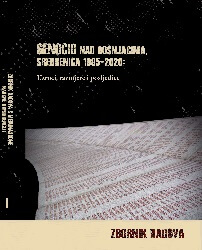Tranzicijski, posttranzicijski i strateški narativi o genocidu u Bosni i Hercegovini
Transitional, Post-transitional and Strategic Narratives about Genocide in Bosnia and Herzegovina
Author(s): Nevenka Tromp
Subject(s): International Law, Law and Transitional Justice, Political history, Criminology, Studies in violence and power, Victimology, Transformation Period (1990 - 2010)
Published by: Institut za istraživanje zločina protiv čovječnosti i međunarodnog prava Univerziteta u Sarajevu
Keywords: Disintegration of Yugoslavia; ICTY; Genocide; Bosnia-Herzegovina; Srebrenica; Transitional Justice; Post-Transitional Justice; Strategic Narratives;
Summary/Abstract: This article explores the transitional, post-transitional and strategic narratives about the wars in the former Yugoslavia, more specifically in Bosnia and Herzegovina. The criminal justice narrative created by the International Criminal Tribunal for the former Yugoslavia (ICTY) dominates the transitional narratives about the Yugoslav wars. It is not uncommon that both sides - the victims and the perpetrators – express dissatisfaction with the justice outcome depending on the verdict. Transitional narratives based on the criminal trials are expected to provide clarity on the distinction between “bad” and “good” guys; between perpetrators and victims; between the criminality of the perpetrating side and the response of the victim’s side. With the passage of time, all transitional narratives will be challenged by post-transitional narratives, launched by various societal and political actors for different reasons with specific objectives behind them. For example, the ruling post-conflict elites can decide to create a post-transitional narrative in which they will try to re-interpret or counter the existing transitional narratives with the goal to exonerate the policies of the predecessor regime that led to the violence by reintroducing the “politics of the past” into the “politics of the present” in the perusal of the still to be achieved political objectives of the predecessor regime. Using the example of the ICTY genocide judgments, this article will explore how its transitional narrative of genocide has been undermined by the post-transitional narratives launched by the Serbian post-conflict elites in the perusal of the unfulfilled strategic goals of the predecessor regimes.
- Page Range: 551-604
- Page Count: 54
- Publication Year: 2021
- Language: Bosnian
- Content File-PDF

